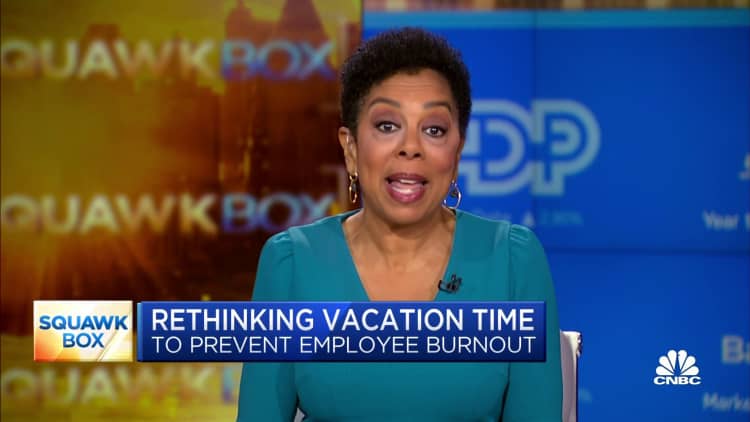[ad_1]

Melanie Langsett is taking the days around July 4 to relax, catch up with friends and celebrate her son’s birthday. She’s using a benefit her employer, Deloitte, calls “Collective Disconnect” days.
These are times, in addition to other paid time away from the office, when the entire workforce is off at the same time, giving employees the chance to truly unplug.
“I’ll be taking full advantage,” said Langsett, the leader of rewards, recognition and wellbeing for Deloitte U.S., in an email. “It’s so important that leaders walk the talk and model behaviors that show that they are using the offerings provided by the organization, and this includes vacation time.”
More from Personal Finance:
How to manage your psyche for better finances
Tax-savvy ways to donate money, according to expert
Well-being is more important than assets, survey finds
The benefits of time away from work
More employers are recognizing the need to reduce employee burnout, as employees report overall better mental health, increased job satisfaction, and being more engaged and productive upon returning from vacation.
Yet it’s still a challenge for many workers to disengage from the office. More than half, 55%, of U.S. workers say they don’t fully unplug from their job, and 17% say they stay fully connected away from work, according to a survey conducted by The Harris Poll of more than 2,000 workers on behalf of Ceridian, a human resource technology company.
“In order to maintain your overall health, you need to take time for yourself time to replenish, time to recharge yourself and time to disconnect,” said Michelle Bonam, Ceridian’s vice president of organizational effectiveness. “And if you don’t disconnect, you don’t truly get that time.”
Why some professionals don’t take time off
Fear of missing out is one reason why many professionals stay plugged in or don’t take vacation time.
“The pay-for-performance culture in the U.S. drives the belief that you negatively impact your own performance if you miss out on an opportunity while taking time away from work,” said Langsett.
In order to maintain your overall health, you need to take time for yourself.
Michelle Bonam
vice president of organizational effectiveness at Ceridian
Increased workloads upon return and expectations to attend meetings and return emails on vacation also keep many professionals from taking time to unplug. Stress around increased layoffs can also increase the fear of not being essential.
Best practices to help employees recharge
Leaders should give clear guidelines for how the work will get done.
“Fundamentally, your job wouldn’t exist if that role wasn’t needed within the organization,” said Bonam. “Work with your employees, to let them know if something is truly critical and you really need them to respond, how you will get in touch with them while they’re on vacation.”
Managers should also identify the people who can make decisions in someone’s absence.
The benefits and challenges of remote work
Swissmediavision | Istock | Getty Images
Eighty-four percent of employees surveyed say remote work makes it easier to get away. The flip side of that is that it also makes it harder to completely unplug.
“I get the sense that they’re okay with that, because they’re enjoying that flexibility of being able to work remotely,” said Bonam.
Ceridian provides its employees with two wellness days a year, when almost the entire company gets the day off.
It is also working to establish “refresh days” at the team level. “That way, at least the people that you work closely with on an ongoing basis, they’re all disconnected on that day, and that it results in a higher degree of replenishment on those days,” she said. Bonam has already taken a weeklong vacation and has another break planned for the fall.
[ad_2]
Source link



